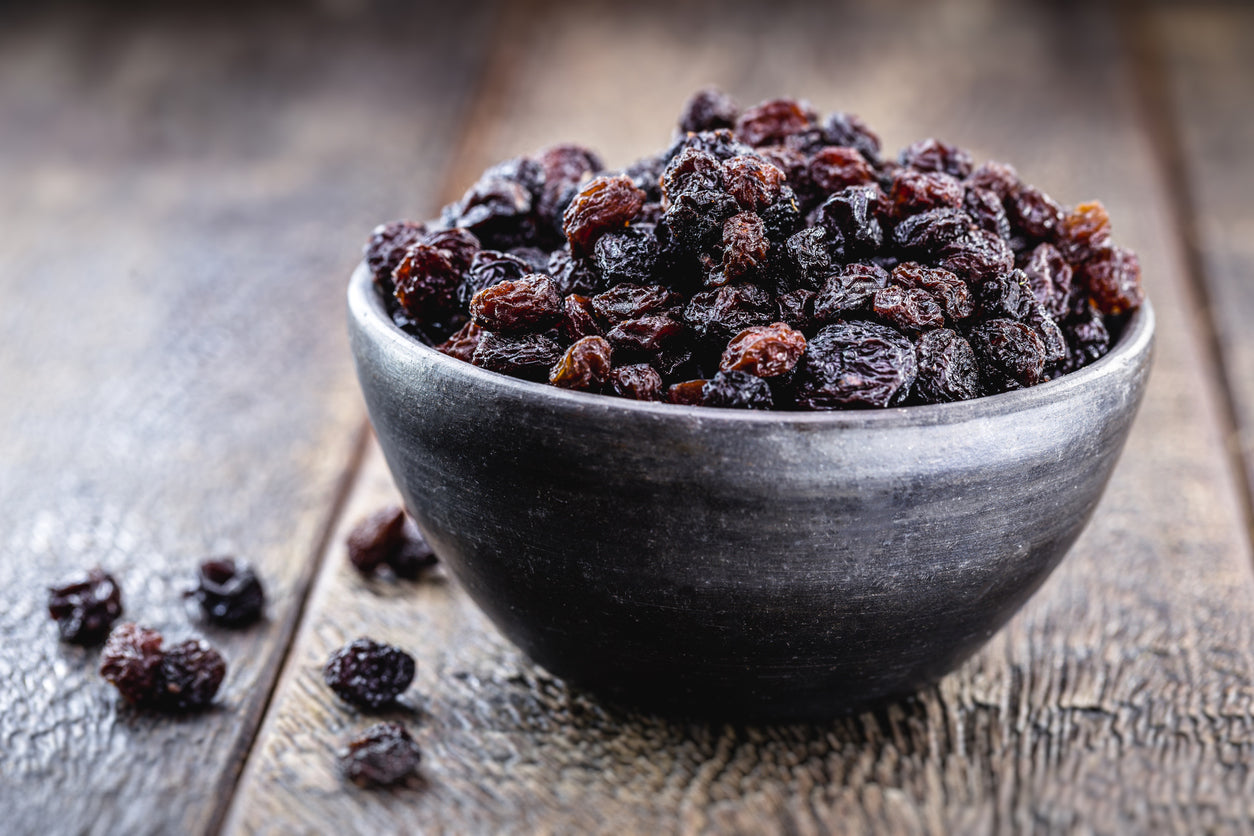“Raisin’” expectations – 4 eye-opening reasons to enjoy dried grapes

A handful of irresistibly sweet and satisfyingly chewy raisins makes a tasty snack. But does the deliciousness of raisins reflect their true nutritional value - or does it hide pitfalls? In other words, are these tasty morsels really good for you?
Raisins, of course, are merely grapes that have been dried - either in the sun or by way of a food dehydrator. As dehydrated grapes (or, if you prefer, grapes that have been sunbathing), raisins contain all the beneficial minerals, vitamins, and antioxidants that make fresh grapes a healthy dietary choice. So, it’s not surprising that raisins are packed with nutrition. What is surprising is the unexpected ways in which they promote overall health.
Raisins deliver the nutritional “goods”
Raisins contain an awe-inspiring variety of essential vitamins and minerals that benefit the body. The healthy amounts of potassium and magnesium in raisins help to regulate blood pressure, while iron supports efficient circulation and helps to prevent anemia. (The iron in raisins is particularly beneficial for people on vegetarian or vegan diets, for whom getting enough iron can be a challenge).
In addition, raisins are packed with the natural sugars glucose and fructose, which can provide a quick energy burst. Because raisins also deliver generous amounts of fiber along with sugars, these little morsels have a relatively low glycemic index and won’t cause blood sugar to “spike.” It’s also worth noting that raisins are fat- and cholesterol-free! Raisins are also a good source of vitamin A - which helps preserve sharp vision - and they also offer some immune-boosting vitamin C.
Finally, raisins deliver boron, a trace element that the body needs for efficient absorption of calcium and the building of bones and teeth. In fact, boron may even play a role in preventing osteoporosis. Because raisins are relatively high in calories (at 85 per ounce), it’s best to eat them in judicious amounts - and stick to a few handfuls a day.
Raisins are an undeniable gift to the digestive system
A 100-gram of raisins, about 3.5 ounces, has over 3 grams of both - soluble and insoluble fiber. (Natural health experts advise getting between 25 to 28 grams of fiber a day, so raisins can play a part in helping you reach that goal). So, what’s the big deal about fiber? It turns out that higher-fiber diets are believed to help lower harmful LDL cholesterol - and have also been found to protect against some forms of cancer. But that’s not all. Soluble fiber helps to ensure good overall digestion - while insoluble fiber can ward off constipation and help flush waste from the body.
Surprisingly, while raisins aren’t a low-calorie food, they can still support a weight loss journey when eaten in moderate amounts. Their generous amounts of fiber, coupled with their sweet, indulgent taste, allow raisins to help you feel fuller for longer - helping to control your appetite and reducing the tendency to “binge” on unhealthy foods.
Raisins are anti-inflammatory and antioxidant
Like grapes, raisins contain potent plant chemicals called polyphenols. These compounds, which include tartaric acid, resveratrol, and catechins, have antioxidant properties that help fight harmful free radicals that can cause oxidative damage - and trigger conditions like heart disease, cancer, and diabetes.
Compounds in raisins also have anti-inflammatory effects, allowing them to ease inflammation in the brain and promote healthy cognitive function. And polyphenols in raisins have one more beneficial “anti” trick up their sleeves. Studies suggest that they are antibacterial and can help to defend against pathogenic (infection-causing) microbes.
Raisins promote oral health and a “happy mouth”
This one may sound a little far-fetched, but we promise you: it’s legit. In a study published in the Journal of Nutrition, the scientists credited oleanic and linoleic acids in raisins with protecting against cavities and tooth decay. Raisins are also a good source of calcium, which helps protect tooth enamel. And let’s not forget their antibacterial properties, which allow them to reduce bacterial growth in the mouth and help to protect against periodontal disease. The researchers concluded by recommending raisins as a “healthy alternative” to sugary snacks. Although it may seem counterintuitive, the fact is: snacking on sweet, flavorful raisins can help promote a healthy mouth!
So, enjoy raisins in yogurt, oatmeal, baked goods, and salads. They are also MVPs when used in trail mix and granola. Or, pair them with carrots for a tasty carrot-raisin salad, a treat for both your taste buds and your eyes. (Raisins and carrots contain beta-carotene, an antioxidant plant pigment believed to help preserve healthy vision). Of course, you can always just nibble raisins straight from the box!
Convenient, portable, tasty, and nutritious, raisins (in moderation) make a fabulous addition to your healthy diet.
Sources for this article include:






